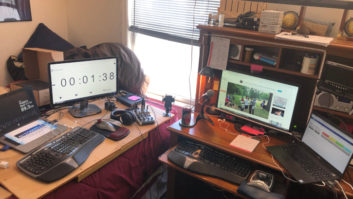The author is U.K. sales and marketing manager for Glensound.

Regarding Radio World’s feature “Let’s Talk About Codec Trends” (Jan. 2), I think it is important to state the role that HD Voice is playing in the broadcast world on the mobile phone networks (as opposed to fixed line codecs), as compliment to the options stated in your feature.
HD Voice devices are not an alternative to stereo full-bandwidth codecs in just the same way that stereo full-bandwidth codecs are not the solution in all applications. If the requirement is single-channel voice reporting for news and sports, HD Voice on 3G networks offers significant benefits, for several reasons.
1. Access
In countries that offer HD Voice on their 3G mobile networks, the ability to get signals on air is greatly increased. In congested environments (stadiums, sport events, concerts, film premiers, etc.) there is a high demand on the IP network.
In these environments, HD Voice offers a reliable and simple connection option, just using a battery powered, portable mobile phone. In the U.K., the BBC used our own HD Voice version for audio broadcasts following the Olympic torch relay, as there was low availability of IP bandwidth due to people taking pictures and posting them to Facebook (for example).
Within the mobile telephone world, it is important to realize that HD Voice is just a voice call on the mobile network, so it does not need to use the mobile data service — a normal voice SIM is all that is required. This means that it is separated from all data issues of bandwidth availability and fluctuation.
Once the call is connected, it will stay connected in the same way as a mobile phone. The only exception to this is if you are travelling and move out of the network area, but most broadcasters will be stationary for reports.
A phone call is always much easier to establish and maintain than an IP codec connection.
2. Quality
If the requirement is single-channel voice, then HD Voice will give you a 7 kHz link. It’s not stereo, and it isn’t suitable for music; but for voice broadcasting, it’s all that is needed.
It is also very effective at suppressing background noise so that news reporters can be heard clearly.
3. Ease of Use
It’s a phone. Calls are as simple to establish as a normal mobile, and no setup or configuration is required. Non-technical reporters or announcers love this fact.
4. Price
HD Voice is G722.2 or AMR-wideband. There is no need to pay the prices for codecs that give multichannel, or the high-quality, high-bandwidth algorithms, if all you are going to use it for is single-channel voice.
5. Delay
The delay is the same as a normal mobile phone call, so it is perfect for two-way conversations. You do not need to allow buffering on a HD Voice system. Indeed, on tests in the U.K. on the Orange network, on the same cell, the HD Voice delay was actually less than a normal mobile phone call.
Downside?
HD Voice is still fairly new and it is not available everywhere (it’s not yet in the U.S. for example, but it’ll be there soon). So far, HD Voice is available in about 39 countries and this is increasing all the time.
At the moment, the call has to be on the same network, within the same country (with one recent exception). For most broadcasters, this is not a problem. All current systems are on the 3G network, but versions for the 4G network are expected to follow.
The example given in the codecs article, about Italy, was interesting. At Glensound, we supplied 40 HD Voice 7 kHz Broadcasters’ Mobile Phones recently to Rai. Giovanni Ridolfi, head of RAI Radio Engineering, commented on the high audio quality, low latency and robust connectivity and said that RAI’s journalists found the unit intuitive to use.
If a broadcaster has access to HD Voice on mobile networks, it is a real cost-effective alternative for remote broadcasting.
Glensound provides solutions for remote news and sport reporting. Marc Wilson has been working in audio for 23 years. Comment on this or any story; email [email protected].












